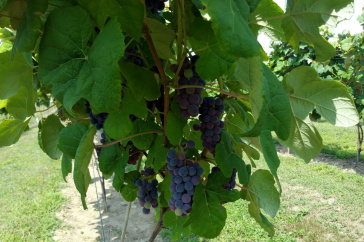The University of New Hampshire is a flagship research university that inspires innovation and transforms lives in our state, nation and world. More than 16,000 students from all 50 states and 71 countries engage with an award-winning faculty in top ranked programs in business, engineering, law, health and human services, liberal arts and the sciences across more than 200 programs of study. UNH’s research portfolio includes partnerships with NASA, NOAA, NSF and NIH, receiving more than $100 million in competitive external funding every year to further explore and define the frontiers of land, sea and space.
UNH Scientists Explore Varieties of Seedless Table Grapes to Grow in N.H.

University of New Hampshire researchers have found certain varieties of seedless table grapes do better growing in New Hampshire’s colder climate than others. The new research was conducted by New Hampshire Agricultural Experiment Station researcher Becky Sideman, extension professor of sustainable horticulture production, and George Hamilton, extension field specialist, at the Woodman Horticultural Research Farm, a facility of the the NH Agricultural Experiment Station.
DURHAM, N.H. – University of New Hampshire researchers have found certain varieties of seedless table grapes grow better in New Hampshire’s colder climate than others.
The research project, funded by the New Hampshire Agricultural Experiment Station, aims to determine which varieties of seedless table grapes are best suited to New Hampshire production, and to determine which growing systems are best suited to those varieties. The results are particularly relevant to growers in New Hampshire and northern New England.
The new research was conducted by experiment station researcher Becky Sideman, extension professor of sustainable horticulture production, and George Hamilton, extension field specialist.
“Seedless table grapes are typically grown in much warmer climates, although several newer varieties released since the 1970s promise increased winter hardiness,” said Sideman. Hamilton collaborated with vineyard owner John Lastowka in Merrimack to conduct a preliminary trial, and the best varieties were selected for the UNH research vineyard.
Eight varieties of seedless table grapes that were planted in a vineyard at Woodman Farm in May 2015 are being evaluated: Canadice, Concord Seedless, Lakemont, Marquis, Mars, Reliance, Thomcord, and Vanessa. Now in their third year, all varieties are producing fruit.
Most varieties had 100 percent winter survival and showed good vigor during summer. However, three varieties -- Thomcord, Lakemont, and Marquis – experienced some winter mortality and poor vigor. The highest mortality and lowest vigor was observed for Thomcord, while Lakemont and Marquis had intermediate mortality and vigor.
Researchers have been taking note of how the different varieties respond to common grape disease, such as anthracnose, downy mildew, and powdery mildew. In 2016, all of these diseases were present in the vineyard. Some of the varieties, such as Canadice and Concord Seedless, remained relatively symptom-free in the face of all three diseases, whereas other varieties appeared to be especially susceptible to certain diseases. Lakemont and Thomcord were particularly susceptible to downy mildew, and Marquis was highly susceptible to both downy and powdery mildew as well as to anthracnose.
This material is based upon work supported by the NH Agricultural Experiment Station, through joint funding of the National Institute of Food and Agriculture, U.S. Department of Agriculture, under award number 1006928, and the state of New Hampshire. This work also was supported by the NH Department of Agriculture, Markets & Food through NH Specialty Crop Block Grant 14-SCBGP-NH-0033. For additional information about this research, visit https://extension.unh.edu/resources/files/Resource006259_Rep8964.pdf.
Founded in 1887, the NH Agricultural Experiment Station at the UNH College of Life Sciences and Agriculture is UNH’s original research center and an elemental component of New Hampshire's land-grant university heritage and mission.
PHOTOS AVAILABLE FOR DOWNLOAD
https://colsa.unh.edu/nhaes/sites/colsa.unh.edu.nhaes/files/media/images/unhvineyard.jpg
https://colsa.unh.edu/nhaes/sites/colsa.unh.edu.nhaes/files/media/images/unhgrapes1.jpg
https://colsa.unh.edu/nhaes/sites/colsa.unh.edu.nhaes/files/media/images/unhgrapes2.jpg
University of New Hampshire researchers have found certain varieties of seedless table grapes do better growing in New Hampshire’s colder climate than others. The new research was conducted by New Hampshire Agricultural Experiment Station researcher Becky Sideman, extension professor of sustainable horticulture production, and George Hamilton, extension field specialist, at the Woodman Horticultural Research Farm, a facility of the the NH Agricultural Experiment Station.
-
Media Contact
Lori Tyler Gula, PhD | NH Agricultural Experiment Station | lori.gula@unh.edu | 603-862-1452
Latest News
-
January 12, 2026
-
December 4, 2025
-
November 26, 2025
-
November 6, 2025
-
November 5, 2025













































